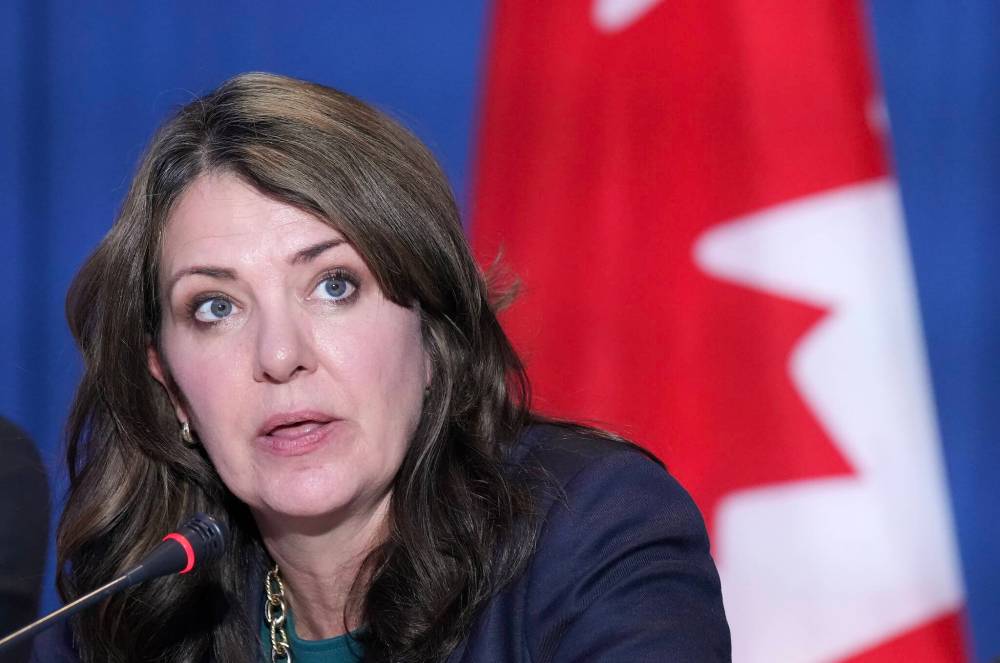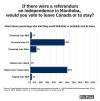Alberta premier’s talk of separation a political ploy and a dangerous distraction
Advertisement
Read this article for free:
or
Already have an account? Log in here »
To continue reading, please subscribe:
Monthly Digital Subscription
$0 for the first 4 weeks*
- Enjoy unlimited reading on winnipegfreepress.com
- Read the E-Edition, our digital replica newspaper
- Access News Break, our award-winning app
- Play interactive puzzles
*No charge for 4 weeks then price increases to the regular rate of $19.00 plus GST every four weeks. Offer available to new and qualified returning subscribers only. Cancel any time.
Monthly Digital Subscription
$4.75/week*
- Enjoy unlimited reading on winnipegfreepress.com
- Read the E-Edition, our digital replica newspaper
- Access News Break, our award-winning app
- Play interactive puzzles
*Billed as $19 plus GST every four weeks. Cancel any time.
To continue reading, please subscribe:
Add Free Press access to your Brandon Sun subscription for only an additional
$1 for the first 4 weeks*
*Your next subscription payment will increase by $1.00 and you will be charged $16.99 plus GST for four weeks. After four weeks, your payment will increase to $23.99 plus GST every four weeks.
Read unlimited articles for free today:
or
Already have an account? Log in here »
Hey there, time traveller!
This article was published 02/05/2025 (215 days ago), so information in it may no longer be current.
One week before the 1995 referendum on whether Quebec should separate from Canada, the Grand Council of the Crees held a vote.
“Do you consent, as a people, that the government of Quebec separate the James Bay Crees and Cree traditional territory from Canada in the event of a Yes vote in the Quebec referendum?”
That was the question posed to 6,380 citizens. Nearly all the votes — 96.3 per cent — indicated a desire to remain in Canada, and a vote by nearby Inuit had the same result.

NATHAN DENETTE / THE CANADIAN PRESS FILES
Alberta Premier Danielle Smith
At the time, the GCC issued a 530-page legal report titled Sovereign Injustice, which stated: “The central conclusion of this study is that Aboriginal peoples cannot be forcibly included in any future Quebec state. Any such action would lack both validity and legitimacy, from the viewpoint of international, Canadian and Aboriginal law and practice.”
Leaders in Quebec, unsurprisingly, disagreed.
Even after the “no” side won the referendum, leaders such as former Quebec premier Jacques Parizeau regularly declared that the rights of Quebec citizens supersede First Nations rights and sovereignty.
Several court cases in Canada have tried to answer the question since, and First Nations consistently win the argument.
Take, for example, last October, when the Superior Court of Quebec ruled the provincial government failed to uphold its “constitutional duty” and consult with Mitchikanibikok Inik First Nation on mining projects on the community’s lands.
“The court recognized what we have always said: the Mitchikanibikok Inik have never given up our rights and sovereignty, and Quebec must stop allowing claims and impacting our territory without asking us first,” Chief Casey Ratt said afterward.
In other words, there is no legitimate or legal decision, precedent or argument for a Canadian province to secede from Confederation and take Indigenous lands without the denial of Indigenous rights and a whole lot of conflict.
Alberta Premier Danielle Smith might want to pay attention.
On Tuesday, one day after the federal election, Smith announced that her government was going to table Bill 54, which promises to reduce the threshold by half for Alberta residents to provoke a referendum on separating from Canada.
If passed, the law states that only 177,000 (or 3.5 per cent of) Albertans need to sign a petition for a referendum to be triggered on an issue.
Interest in separatism has been growing in certain political circles in that province.
An Angus Reid poll published during the federal campaign indicated that three in 10 citizens in Alberta and Saskatchewan “would vote to leave Confederation, whether to form their own country or join the United States.”
Western alienation is real, but extreme views for separatism are a minority.
Provincial separation from Canada without First Nations involvement is also unconstitutional, illegal and unprecedented.
The only certainty is, if a province separated from Confederation, treaties would become void, as would the Crown’s relationship with Indigenous nations and other Canadian laws that define land ownership.
Simply put, provincial land would revert to First Nations territories.
Any province could, of course, put forward some fantastical argument that First Nations rights don’t matter, but international law would dictate otherwise.
Then, there’s Canada’s Constitution, which requires the federal government to uphold legal obligations surrounding consultation and consent on First Nations lands.
I haven’t even got to Indigenous resistance yet.
In a letter after the announcement of Bill 54, Treaty 6 chiefs called on the premier to “immediately abandon this dangerous rhetoric and recognize that treaty obligations are not optional.”
“Let us be absolutely clear,” the letter reads. “Our nations do not and will never consent to the separation of our treaty territories. These lands were never ceded, nor surrendered.”
There is no doubt whatsoever that there are 177,000 disenfranchised Albertans who are unhappy with the federal Liberals winning a minority in Parliament.
If Bill 54 passes, we’re in store for an Alberta referendum on separation — and, frankly, a big waste of time and resources, and a whole lot of conflict.
That brings me to the real reason the Alberta premier is doing this.
Smith has a history of making arguments on false premises to gain political points. Last year, she vowed to ban top and bottom gender reassignment surgeries for minors 17 and under, something that is not legal and not happening.
Smith’s promise to allow for citizens to instigate a referendum on separatism when seven in 10 voters don’t want to leave Confederation should be seen for what it is: a ploy to gain support after a divisive election.
The fact is that the premier is in the middle of several political scandals related to health care and her ties to U.S. President Donald Trump, and needs a distraction from all of that.
The problem is that the collateral damage from Bill 54 will stoke deep conflict between a small minority of Albertans and Indigenous peoples — a recipe that will end in nothing but bad things for everyone and, perhaps spark violence.
niigaan.sinclair@freepress.mb.ca

Niigaan Sinclair is Anishinaabe and is a columnist at the Winnipeg Free Press.
Our newsroom depends on a growing audience of readers to power our journalism. If you are not a paid reader, please consider becoming a subscriber.
Our newsroom depends on its audience of readers to power our journalism. Thank you for your support.









